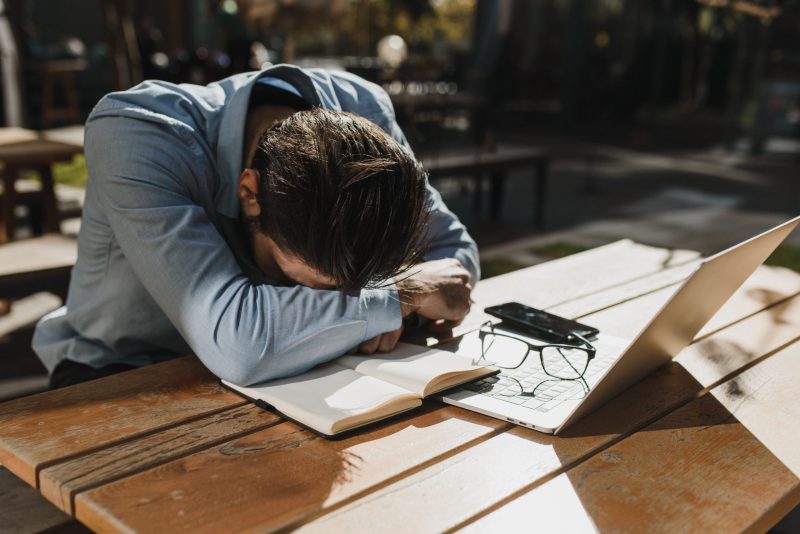How hard is it for you to get out of bed every morning? According to experts, depriving yourself of two hours of sleep so you can watch one more episode of your favorite show is more harmful than you think. Here’s what they have to say about the potential health risks and tips to improve your sleep patterns:
Is 6 Hours of Sleep Enough For Anyone?
A surprising number of people sleep less than the recommended amount. The American Academy of Sleep Medicine has declared that the ideal number is seven hours of sleep.
The amount of sleep adults need is actually between “seven and nine hours of sleep,” sleep physician and psychiatrist Dr. Bhanu Kolla explains. If people allowed themselves to sleep as long as their body wanted to, most of them would sleep for upwards of nine hours naturally.

Some adults may need even 10 hours of sleep every night in order to be completely rested, Kolla adds. “The AASM doesn’t have an upper limit in terms for adults in of how much sleep you need.”
Now according to sleep experts, some individuals require less sleep than the recommended duration, so six hours is enough to that degree.
“If it’s happening naturally, so they’re going to bed when they’re drowsy waking up on their own without an alarm, and they’re consistently getting six hours and functioning very well, it probably is what their body needs,” Kolla states. “But this isn’t that common.”
Of course, there are the people who can function normally with as little as four hours of sleep. These “short-sleepers” can naturally sleep less than six hours a night without suffering the consequences.
These types of sleepers are rare, says Dr. Andrew Varga, a neuroscientist and physician at the Mount Sinai Integrative Sleep Center. “These are people who have a family gene mutation…We’re talking very tiny numbers of people.”
Yet, most people are sleeping on six hours a night.
Why Aren’t People Sleeping?
According to the U.S. Centers for Disease Control, one-third of adults in the United States report that they get less than the recommended amount of sleep.
“Most people do not get enough sleep because of obligations like work or school, lifestyle choices, poor sleep hygiene, or sleep disorders,” says Shelby Harris, PsyD, a clinical psychology specializing in behavioral sleep medicine states.

Excessive consumption of substances like alcohol or drugs, particularly before bedtime, insufficient physical activity, excessive screen time near bedtime, overindulgence in caffeine, and excessive napping can collectively contribute to the reason why people just aren’t sleeping enough.
The Real Reason Why 6 Hours Isn’t Enough
Sleeping less than seven hours a night without giving yourself time to make up those hours can lead to chronic sleep deprivation. This increases the risk of a number of health issues, sleep experts warn. Even one night of bad sleep can have dramatic consequences the next day.
Other side effects of bad sleeping patterns include:
Cognitive Impairment and Drowsiness
“Depending on your baseline level of sleep, six hours may leave you feelings drowsy, fatigued, irritable, or give you the urge to nap throughout the day,” says Kolla.
“I think if you were to actually put (people who sleep six hours a night) to the test and look at how they’re functioning during the day cognitively, you would definitely find deficits,” says Varga. This would include slower reaction times, memory, and difficulty paying attention. However, this is only the tip of the iceberg of problems that sleep deprived people have.
Hurting Internal Organ Function
“Habitual sleep deprivation can effect every organ of the body,” warns Varga. “It’s linked to an elevated risk of heart attack, stroke, hypertension, heart disease, diabetes, kidney disease and metabolic syndrome,” experts note.
“There also seems to be an increased risk (of mortality) and as you go below seven, and the further down that path you go, the higher the risk,” says Kolla.
Mental Health Issues
“Research shows that sleeping too little is also associated with an increased risk of developing depression, anxiety, bipolar disorder, and Alzheimer’s,” Kolla reports.
How To Get More Sleep

Getting more sleep takes time and consistency.
Here are some recommendations experts have to catch more ZZZ’s:
- Be consistent: Try to go to bed at the same time and wake up at the same time every day
- Create a wind-down routine at night to help your body relax.
- Cut down on screen time at night, and avoid using digital devices 30 minutes to one hour before bedtime,
- Limit caffeine and alcohol intake
- Exercise regularly.
- Avoid napping too close to bedtime.
Lastly, here is an informative list with the recommended hours of sleep for each age group according to the AASM:
- Infants (4–12 months): 12–16 hours, including naps
- Toddler (1–2 years): 11–14 hours, including naps
- Preschool-age children (3–5 years): 10–13 hours, including naps
- School-age children (6–12 years): 9–12 hours
- Teenagers (13–18 years): 8–10 hours
- Adults (18+ years): 7 or more hours
Do you get enough sleep?
